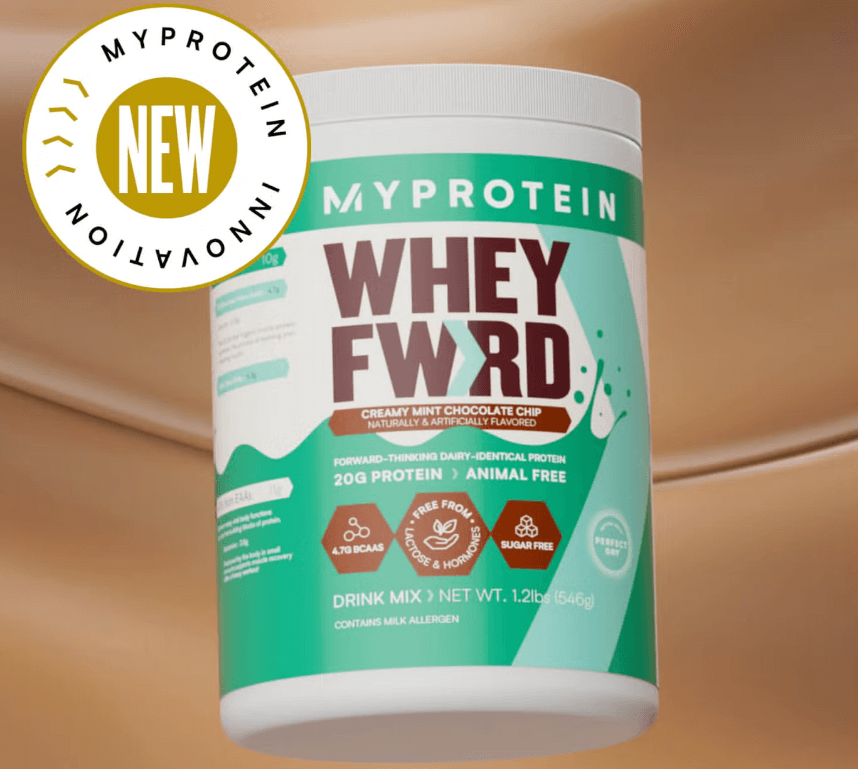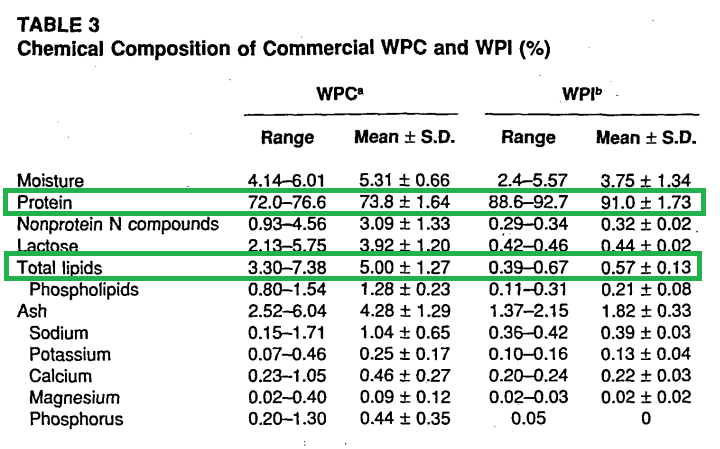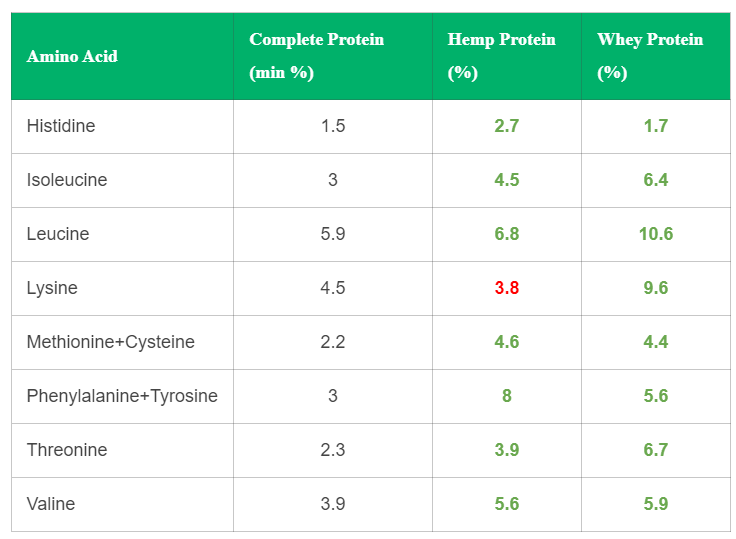The vast majority of whey protein powder is not vegan.
However, they are vegetarian for the most part, unless there’s a vitamin or mineral added that’s animal-based (e.g. vitamin D).
While whey protein may not be vegan in most cases, I’ll go over plant-based alternatives that are just as good shortly.
Table of Contents
Is Whey Protein Ever Vegan-Friendly?
I had to update this post because there is actually such a thing as vegan whey protein, which is made through bacterial fermentation.
It’s completely animal free, the bacteria is fed simple sugars (vegan-friendly of course) and they convert that sugar to whey protein as a byproduct, which is identical to the whey protein found in cow’s milk.
It’s not very popular, but worth mentioning. If you’re looking for a recommendation, MyProtein has a line of vegan whey protein called Whey Forward. (Just be careful you don’t order one of their “normal” whey protein powders.)

Note that this can still trigger allergies.
What Is Whey Protein Made From?
Milk has two main types of protein in it:
- Casein – Slow digesting, makes up about 80% of the protein in milk.
- Whey – Fast digesting, makes up about 20% of the protein in milk.
Both of these are extracted during the cheese making process. Whey is a liquid that is removed after the milk coagulates (i.e. thickens, clumps).
Whey protein isolate is extracted from milk (typically cow’s milk).
How Is Whey Protein Made?
Commercial whey production is fairly simple (1):
- Skim milk is adjusted to have a pH of 4.6 (by adding acid or bacteria) at 20 degree Celsius
- The curd is cut and cooked
- The resulting whey is drained off
That whey product can then be dried to make a protein powder.
Note that whey isn’t 100% protein, there’s a small amount of lactose usually in it still, which is why people who are lactose-intolerant generally shouldn’t use whey protein powders.
Types of Whey Protein
Depending on the exact process used and when the whey is removed, the resulting whey is generally described as one of three forms:
- Whey protein concentrate – Anywhere from 30-90% protein, with most of the rest being fats. It’s higher in calories than whey protein isolate, so you’ll usually find it in higher calorie supplements made for bulking.
- Whey protein isolate – The most common type of whey used in whey protein supplements. It’s almost entirely protein with low levels of fats and lactose. The protein content is usually at least 90% depending on the purity.
- Whey protein hydrolysate – This isn’t a form that you’ll find in supplements. It’s essentially a form where the why has been predigested to make digestion and absorption easier. You’ll find it in medical supplements and infant formulas, not in athletic supplements.
On top of having a higher protein content than the concentrate form, whey protein isolate usually tastes better as well.
Research has shown that commercial whey protein concentrate develops a “stale whey” off-flavor, mainly due to the higher fat content, as seen below in the table.

Whey protein isolate is by far the most common type of protein powder sold. However, other forms of whey are often used in packaged food products.
Is Whey Protein Vegan?
There is no whey protein in the world that is vegan. It is always derived from milk, which is not vegan-friendly because it’s an animal product.
That probably seems obvious at this point, but I wanted to be crystal clear.
Why Aren’t All Whey Protein Supplements Vegetarian?
Any type of lacto-vegetarian will drink milk, and there are no other animal products added to the cheese-making process early on, so it seems like all whey protein should be vegetarian.
The vast majority of whey supplements are vegetarian friendly, but not all of them. In particular, some products that are “all-in-one” shakes are fortified with vitamins and minerals that might come from animal sources.
In short, vegetarians should always look for a “vegetarian” certified sticker if they’re buying a whey protein product if they want to be sure about it.
The majority of whey protein supplements are considered suitable lacto-vegetarian, but some do have added vitamins that come from animal sources (most notably vitamin D).
Vegan Alternatives to Whey Protein
Thanks to technology, we can extract protein from almost any food source, even if some are easier than others.
The most common plant-based alternatives to whey that you’ll find in supplements are:
- Pea protein – By far the most common in vegan protein powders. Pea protein is cheap, relatively high quality, and tastes better than most other plant proteins.
- Hemp protein – The second most common plant protein powder. It doesn’t taste particularly good, but has a solid amino acid profile and is pretty affordable.
- Rice protein – Usually extracted from brown rice, rice protein is often added to plant-based protein powder to round out its amino acid profile.
- Soy protein – Most people think that vegan protein powders are usually made from soy, but it’s actually pretty rare. You’ll need to go out of your way to buy a soy protein isolate powder if you’re looking for one.
There are others like peanut, chia, and pumpkin seed protein, but those are hard to find by themselves. Instead, they are just added to products in small amounts.
Just as whey protein is the most common non-vegan protein powder source, pea protein is by far the most common plant-based protein powder source.
Is Whey Protein Better Than Plant Protein?
Whey protein is considered the gold standard of protein. In particular whey protein isolate is a complete protein that absorbs quickly, perfect for a post-workout shake.
However, studies show that in practice, plant-based protein powders are just as effective at building muscle.
Here’s a quick summary with links to 3 studies that I found comparing whey to plant proteins:
- Study #1 – In a 12 week study of 161 males comparing pea and whey protein, “no difference was obtained between the two protein groups…”
- Study #2 – An 8 week study in young men found that subjects consuming brown rice protein post-workout gained as much muscle as the whey protein group.
- Study #3 – “With a proper combination of sources, vegetable proteins may provide similar benefits as protein from animal sources.”
Those are just a few studies, but it shows the common sense result so far that even if plant proteins are slightly less digestible, they’re still more than enough to meet basic muscle-building demands.
There are several NFL and NBA players who have experienced benefits to their performance after going vegan. If those giant guys can get by on vegan protein sources, it should be good enough for just about anyone.
Current research suggests that any difference between whey and plant-based protein powders is minimal.
Are Plant Proteins Complete Proteins?
The main reason that some people don’t think that plant proteins can be as good as whey is because most plant proteins are not “complete”.
In other words, you couldn’t meet the minimum thresholds for all essential amino acids if you only consumed that particular protein.
For example, when comparing whey vs hemp protein, the main difference is that hemp isn’t quite a complete protein because it’s relatively low in lysine.

It turns out that this doesn’t really matter in practice, because you’ll be eating other foods that have whatever amino acid is missing. No one should be consuming 100% protein powder for their diet.
Dr. Greger has a good video on the protein combining myth that just won’t seem to die.
Even if that mattered, most vegan protein powders have a blend of protein sources and are complete proteins by themselves.
